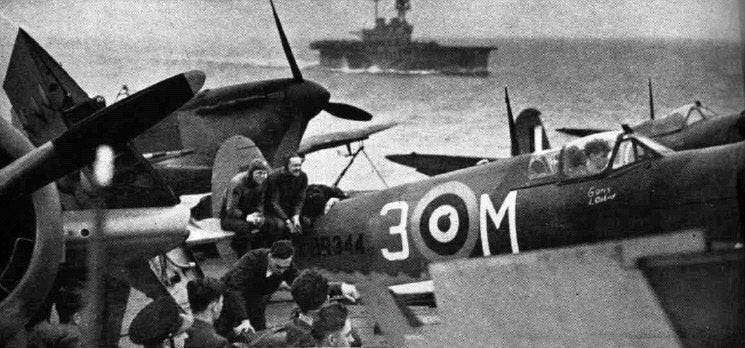Spitfires defend Malta
21st May 1942: Another victory for RAF Spitfires against Messerschmitt 109s

The battle for Malta continued. German and Italian planes continued their assault on the island and any ship that came within distance. British fighter strength had improved considerably after HMS Eagle and USS Wasp had flown off 63 new Spitfires to reinforce the island on 9th May. Nevertheless an unrelenting air battle over the island continued.

On 21st May 1942 Dennis Barnham1 had just returned from four days 'leave' to try to recover from the 'Malta Dog'. He had spent the days starving himself in an attempt to rid himself of the intestinal upset caused by the poor food on the beleaguered island.

It was just over a month since he had arrived on Malta and he gained much intense combat experience in the short time.
‘forty plus, twenty miles out, big jobs and little jobs’
He was at dawn readiness when they were scrambled for "forty plus, twenty miles out, big jobs and little jobs" - a combination of bombers and fighters.
He and his flight of three other Spitfires came down from 15,000 feet to meet the bombers coming in at sea level this time.


On this day he had decided to dispense with the perspex hood covering his cockpit, as a means of improving his all round visibility. It was probably an important decision:
An 88 - low on the water - could easily misjudge our pull-out and plunge straight into the sea - careful then. As the 88 leaps towards us I glimpse back into the glaring sun: we’re in perfect position to attack.
That silver, brilliantly shining sun. Something there. Screwing up my eyes, searching the blinding light-blurrs of grey, irrcongruous lumps of black, then, quite clearly for an instant, straight black wings.
"109s behind, Exiles," I frame the words calmly and quietly, “Break Right".
‘As three more 109s dive head-on under my nose I watch the fourth turning towards me; in a few seconds he will pass below to my left. There's plenty of time to shoot him down. This should be easy.’
If I spoke carefully, I’m now heaving at my controls with all my strength. Sudden island detail close in front of my nose, then sky as I climb. The 109's scatter like spray. Twisting in my seat; my companions can't have heard my order - I’m alone. Enemy fighters everywhere. Two race low overhead; four more on my right. As three more 109s dive head-on under my nose I watch the fourth turning towards me; in a few seconds he will pass below to my left. There's plenty of time to shoot him down. This should be easy.
Controls a little to the left, give him more deflection than that, a little more to the left -- that's fine. He’s flying beautifully now, straight towards the red centre spot of my gunsight. I can feel the hump of the firing button beneath my thumb - wait a little longer:Clatterclatter- clatterclatter, machine-guns, Bom, mom, bom, bom, bom, my cannons making their slower beat as I adjust my fingers. He’s sweeping closer and closer, larger and larger. Flashes on his wings and fuselage. Gigantic in size he disappears under my wing. I heave my Spitfire into a steep turn. On his tail now!
Where is he? Where’s he got to? With my Spitfire in a violently nose-down attitude I'm leaning forward in my straps, peering through my windscreen: on the left the tall narrow rock formation called Filfla stands alone and sunlit, its flat top yellow with grass, some narrow ledges on its vertical sides and white surf breaking round the foot of it. The sea is deep blue and my 109 was black.
It's obviously there, somewhere in front of me. Damned if I can see it. A sudden call in my earphones: “Something's gone in near Filfla."
It must be my 109 that has crashed - the splash must be right underneath me.

Denis Barnham: Malta Spitfire Pilot, originally published as 'One Man's Window'.


